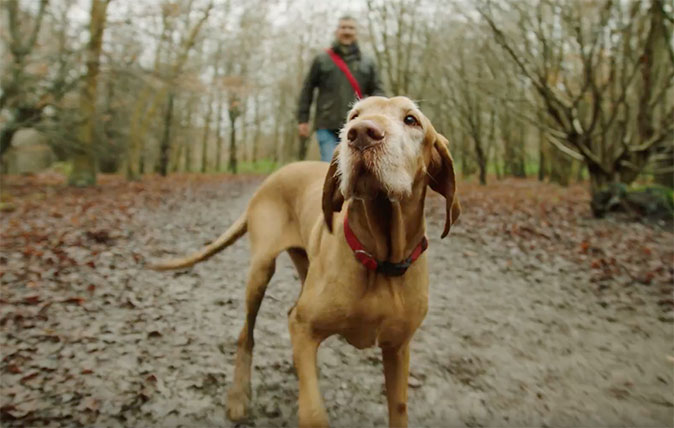Lethargic labrador? Bored border collie? Here's how to cheer up a depressed dog
Apparently, dogs get Seasonal Affective Disorder - or SAD - just as humans do. But there is an answer.

Once upon a time, feeling glum in the wintertime was just a normal part of life. Then it became a syndrome: Seasonal Affective Disorder.
That was back in 1984, when a psychiatrist by the name of Norman Rosenthal became the first to diagnose and describe the disorder.
32 and a bit years later, it turns out that dogs can suffer too. That's the claim made by canine behaviour consultant Nick Jones in the wake of a survey carried out by Forthglade, a Devon-based dog food company.
Dog owners in Britain are roughly half as likely to take their canine friends for a walk of at least half an hour a day during winter. While that's understandable given the dark days and grim weather, it apparently has a real effect on dogs that is akin to suffering from SAD.
If your dog is less playful and energetic than normal, hungrier than usual and spends more time on their own in a quiet corner, they could be affected.
'Symptoms that replicate the human condition'
'The long dark days of winter don’t just take a toll on the two-legged population,' says Jones.
'Our four-legged friends also feel the strain with many exhibiting symptoms that replicate the human condition Seasonal Affective Disorder.
Sign up for the Country Life Newsletter
Exquisite houses, the beauty of Nature, and how to get the most from your life, straight to your inbox.
'Lethargy, an increased appetite, irritability and a reluctance to go outside and exercise are typical behaviours exhibited by dogs in the colder months when natural sunlight is at a minimum.'
Thankfully, Jones says there's an answer.
Ignore the weather and just get out there, he says. Make the effort to play as much as possible, even if it's just playing ball in the back garden. Even playing 'find and fetch' around the house is better than nothing on days when the weather outside really is too filthy to contemplate.
Given that the survey was commissioned by a gourmet dog food maker you won't be surprised to hear that Jones also recommends ensuring your furry friend has a good quality diet – but that seems good advice in any case.
We're still not quite sure whether to take this one entirely seriously, but it made us giggle anyway.
And if it helps a morose mastiff, an old English sheepdog with ennui or a beagle with the blues feel a bit better, well, it's been worth our time.
Toby Keel is Country Life's Digital Director, and has been running the website and social media channels since 2016. A former sports journalist, he writes about property, cars, lifestyle, travel, nature.
-
 From Vinted to Velázquez: The younger generations' appetite for antiques and Old Masters
From Vinted to Velázquez: The younger generations' appetite for antiques and Old MastersThe younger generations’ appetite for everything vintage bodes well for the future, says Huon Mallalieu, at a time when an extraordinary Old Masters collection is about to go under the hammer.
By Huon Mallalieu
-
 In all its glory: One of Britain’s most striking moth species could be making a comeback
In all its glory: One of Britain’s most striking moth species could be making a comebackThe Kentish glory moth has been absent from England and Wales for around 50 years.
By Jack Watkins
